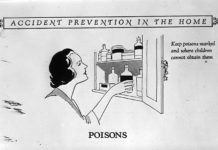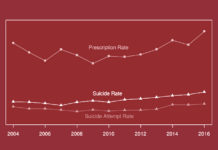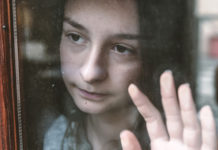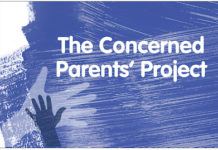Adolescent Suicide and The Black Box Warning: STAT Gets It All Wrong
STAT recently published an opinion piece arguing that the black box warning on antidepressants has led to an increase in adolescent suicide.
It is easily debunked, and reveals once again how our society is regularly misled about research findings related to psychiatric drugs. STAT has lent its good name to a false story that, unfortunately, will resonate loudly with the public.
Large Increase in Poison Control Calls for Children Taking ADHD Drugs
New data shows that calls to US poison control centers have increased significantly for children taking stimulant ADHD drugs.
SSRI Exposure in Pregnancy Alters Fetal Neurodevelopment
Alterations in gray matter and white matter development found in infants of mothers taking SSRI antidepressants during pregnancy.
Suicides Are Increasing – And So Are Antidepressant Prescriptions
Disturbingly, our study and others reveal that the black box warning is now ignored in many countries, since antidepressant prescriptions for children are on the rise again. Despite increasing certainty that antidepressants are ineffective and likely cause suicidal behavior in young people, psychiatry continues to claim that they reduce suicide risk.
A Time For Rain: Teaching Our Children About Sadness
The only way out of the epidemic of feeling-people-turned-medicated-psychiatric-patients is to rebrand and reframe feeling as a cultural collective. And I believe it starts with our messaging as parents and our orientation toward shadow elements like anger and sadness. We have to model a conscious relationship to our own dark parts, and we have to show our children what it looks like to move through these spaces. Feelings can be messy, wild, and sometimes ugly to our constrained sensibilities.
Call to Monitor Adverse Effects of Antipsychotics in Youth
Researchers point to the risks of using antipsychotics with youth and caution against the practice.
Digital Media Use Linked to Increase in ADHD Symptoms
Increased frequency of digital media use can increase symptoms of ADHD among adolescents, study finds.
The Scientism of Childhood and Adolescent Depression
When I was training to be a child psychiatrist in the mid-1990s, childhood depression was considered to be rare, related to adversity, and generally unresponsive to pharmaceutical treatment. Since then much has changed. The psychiatrization of the pain and struggles involved in growing up has caused considerably more harm to young people than good. I believe the science is on my side in this conclusion.
The Concerned Parents’ Project: 31 Questions
The Concerned Parents’ Project grew out of the idea that there may be parents out there who are confused and bewildered by the mixed messages on what it is to have normal and healthy childhood experiences. We posted a new question and answer for parents each day in March.
Johann Hari: Lost Connections
An interview with journalist and author Johann Hari about his latest book: Lost Connections: Uncovering the Real causes of Depression and the Unexpected Solutions, in which he learned that almost everything we have been told about depression and anxiety is wrong.
Rethinking the Nature of Our Woes
Parents must inform themselves about the flaws in the current paradigm if they are to have any chance of thinking sensibly about what might be distressing their child. Toward that end of providing information about those flaws, I interviewed Richard Hallam, author of the new book Abolishing the Concept of Mental Illness: Rethinking the Nature of our Woes.
David Mielke: Educating in the Era of Psychiatric Diagnosis
This week we interview psychology graduate and teacher David Mielke who has become increasingly concerned about the number of children in the education system that have a psychiatric diagnosis and are on psychiatric drugs.
Your Child’s Mind Space
Your child has a room or a shared room where he sleeps, reads, plays video games, and all the rest. But what about that other room where he really resides, the room that is his mind? He takes that room with him everywhere.
Introducing “Ten Tips for Parents”
As I settle into my role as the editor for parent resources here at Mad in America, I’m reaching out to folks who have something to contribute to the conversation and asking them if they would be willing to condense what they know into a Ten Tips format for easy digestion and comprehension. The first four are now available.
Rani Bora: Innate Health and Resilience, How It Differs to Mainstream Psychiatric Treatment
Dr. Rani Bora is a qualified Psychiatrist and Mental Health and Resilience Coach who has studied traditional and alternative approaches to mental well-being, she focuses on holistic ways of supporting people with their mental wellness.
“Virtual Autism” May Explain Explosive Rise in ASD Diagnoses
New clinical case studies have found that many young children who spend too much screen time—on TV’s, video games, tablets and computers—have symptoms labeled as “autism.” When parents take away the screens for a few months the child’s symptoms disappear.
Mo Hannah: Changing the Teaching of the Biological Model
Maureen Hannah, a Professor of Psychology at Siena College, New York, tells of experiences with the psychiatric system, both personally and professionally, and how poor care in the mental health system led to an unexpected and devastating family loss.
The Diseasing of Defiance
Is every defiant child a freedom fighter? Of course not. Disrupting your fourth grade class is not the same as embarking on the underground railway. But is oppositional defiant disorder a label meant to subjugate and to serve the needs of the authorities? Yes, absolutely.
Laurie Irelind — Short Bio
Laurie Irelind, an RN specializing in cardiology, was working as a nurse educator at a large teaching hospital before becoming disabled due to the adverse...
Matt Stevenson — Short Bio
Matt Stevenson is a formerly psychotic American man. After suffering through and recovering from severe psychosis, he now works a normal job and is...
Liat Ben-Moshe — Short Bio
Dr. Liat Ben-Moshe is Assistant Professor of Disability Studies at the University of Toledo. She has written on such topics as deinstitutionalization and incarceration; prison...
David Guttman — Short Bio
David Guttman is a father, an entrepreneur and a crossfitter. He is also a voracious reader, a world traveler and president of First Stop...
Ronda Richardson — Short Bio
Ronda Richardson is an artist and peer support worker from Canada. She wants to see reforms within smaller communities and rural areas, including more...
Sarah Carr, PhD — Short bio
Dr Sarah Carr is Associate Professor of Mental Health Research at Middlesex University London, and Vice-Chair of the National Survivor User Network (NSUN), England.
Jen Constantine – Op-Ed Bio
Jen Constantine is a psychiatric system survivor, mental health advocate, wife, and mom. Jen grew up in the Black Hills of rural South Dakota....



























